While on strike this month, Joe Schubkegel saw his $100,000 set of tools pushed outside and left in the rain. Two days before, his health insurance was canceled. Four days after, he was told he’d been “permanently replaced” at work. All he wanted was to be paid for all of the hours he works, not to be shorted by a system that relentlessly chops down payable time.
But the battle he’s in, a fight between 2,000 striking Chicago-area mechanics and their car dealership bosses, has turned exceedingly nasty—even spiteful.
Schubkegel’s recent experiences with his former employer, Napleton Cadillac of Libertyville, represent the alleged reaction of only a handful of area dealerships. But his broader grievances are, nonetheless, shared by the vast majority of the 2,000 technicians participating in the strike.
They’re not asking for more pay, Schubkegel said. They’re asking for fair pay for their time, and for a new system that pays for hours actually worked rather than the number of hours it’s been predetermined that each repair job should take.
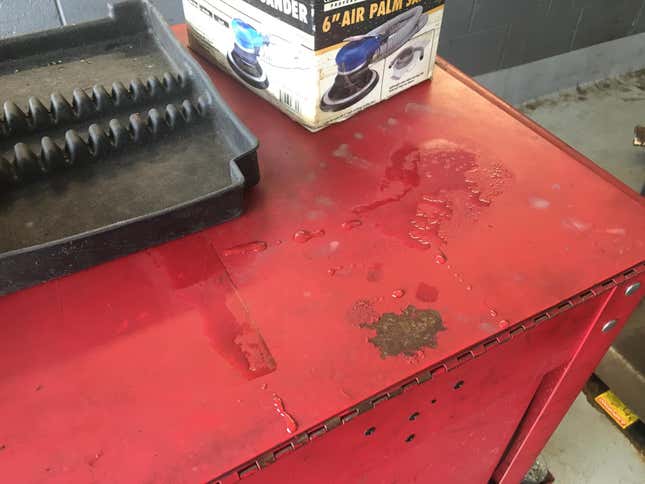
More than three weeks after the Chicago strike began on Aug. 1, Schubkegel and other people who fix and work on a car when you take it to a dealership are still on the strike lines each day.
The strike started when the unionized technicians’ contract with the New Car Dealer Committee expired on July 31, and prompted a quick enough reaction from Schubkegel’s former employer to have his health insurance canceled the same day, he told Jalopnik. The employer declined to comment.
While the unionized technicians are negotiating with dealers as a group, some have gotten intense blowback from individual employers as negotiations between the mechanics’ union, the Automobile Mechanics’ Local 701, and the dealers’ representative committee rage on.
Each side wants the polar opposite: Technicians want to be paid for hours spent at work, but dealers want the same job-based compensation system they’ve always used. At the heart of the battle is that pay system, which technicians say has been increasingly disadvantageous for them.
Chicago Automobile Trade Association president David Sloan told Automotive News the following at the start of the strike:
The strike centers around a dispute over work schedules. The union has asked for a guaranteed 40-hour work week, a change Sloan said dealerships would find unacceptable.
“The dealers want to keep control of their service departments in terms of scheduling,” Sloan said.
An Aug. 10 offer promised technicians wage increases and better health benefits, but, as the Chicago Tribune reported, it was rejected:
The offer included paying “virtually all increases” in health benefits for employees, which would reach $292 a week by the end of the contract, NCDC said, plus 100 percent of pension costs, or $181 per week.
The offer received an “overwhelming rejection” from Local 701 members who voted in Countryside on Aug. 12, the union said.
“It’s an antiquated system,” a striking technician who asked to remain anonymous told Jalopnik. “It worked years ago, when the profession was booming and there was plenty of money to go around.”
The problem, though, is much deeper than individual dealerships. It’s about the entire system of pay for hours worked, scheduling and the ability to have a career, with the dealership committee apparently only offering what they have all along: a wage increase and promises to continue the current benefit plan.
But that doesn’t respond to the actual request: being paid for all hours worked.
“Now that cars have gotten harder to fix, warranties have stepped in and gotten longer, and they pay less, the system doesn’t work correctly anymore,” the technician added. (The group representing area dealers, the New Car Dealer Committee, declined to comment on the negotiations.)
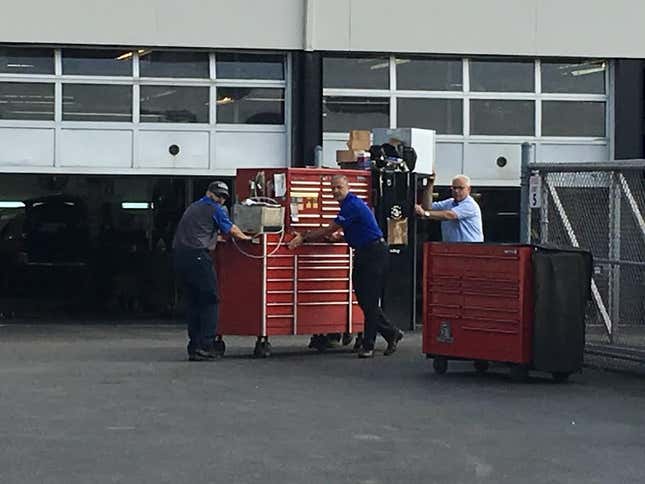
Schubkegel joined striking technicians from a multitude of car dealers teaming up under the Automobile Mechanics’ Local 701 union with a host of complaints, including not just the pay structure but also scheduling issues, a lack of a clear pathway to a career in the industry and increased healthcare costs, a union representative told Jalopnik.
But it’s mainly about pay and a guaranteed 40-hour work week, a demand being pushed by a union that claims to be the largest mechanics’ union in the U.S. and has been around since 1931.
The Chicago Tribune reports that weeks in, some dealers affected by the Local 701 strike have had to stop repairs and lay off non-union employees for lack of jobs coming into the shop.
It’s a mess for car owners, too. Customers think the shops are closed due to the large strike, the Tribune reports, and some dealers are only offering smaller jobs like oil changes and tire rotations because the experienced technicians are out.
The strike came after a proposed “final offer” contract from the New Car Dealer Committee to replace the expired one, Automotive News reported the day it began. The dealerships’ offer was for a wage increase of 5 percent over the course of three years and the continuation of a defined-benefits pension plan.
That sounds decent on the surface, but doesn’t touch what striking technicians want. It also, honestly, isn’t much. On Schubkegel’s $32-an-hour and another Chicago mechanic’s $32.30 an hour pay, the offered 5-percent hourly pay rase would be $1.60 and around $1.61, respectively.
The union rejected the committee’s offer, and with neither side budging, technician shortages and backlash from dealerships, things continue to get uglier as the strike wears on—the tools in the rain being just one example.
A technician from outside of the Chicago area, who isn’t participating in the strike but has been following it, said it all boils down to how dealerships view their employees in the shop.
“It doesn’t matter if you’re a year in the industry or 20 years in the industry, there’s a common theme,” the technician said. “You’re expendable, you’re lucky to be here, and you should be thankful for what you have. That’s why there are all of these labor disputes that are happening right now.”
The Points Of Contention
The most visible point of protest is the pay structure, something mechanics say is poorly understood outside of their industry.
The anonymous Chicago technician said people give him a “deer in the headlights” look on the strike lines when he says he doesn’t necessarily get to log 40 hours for working 40 hours. And Schubkegel said he feels as if customers think mechanics are making all of the money, which is far from the case.
As things are now, technicians say, the system can cut workers out of a third or even more of the hours they put in because the pay structure, put simply, goes by jobs.
Both Schubkegel and a non-striking, non-unionized mechanic from a different state told Jalopnik that almost universally nationwide, each technician job has a certain amount of hours assigned to it. No matter how long it takes to finish, a job only pays its prescribed hours.
As companies continue to chop away at paid hours for the same jobs, they said, it becomes harder and harder to get a job done within the hours a technician is actually allowed to log for it.
Dealerships also tend to make the most money from service and repairs, not vehicle sales. The Chicago technician who asked not to be identified said he currently makes the union-negotiated minimum of $32.30 per hour logged, but that the gap between his hourly rate how much the customers pay for his work continues to get wider.
“In 10 years, I’ve watched the labor rate at the front door go up from $95 an hour to $125 an hour,” the technician said. “And what have I seen of that? I want to say it’s in the neighborhood of $2.50 to $3 an hour raise over 10 years.”
At the dealership Schubkegel worked at, Napleton Cadillac of Libertyville, there was also a difference in pay for jobs under warranty and out of warranty. This is also not uncommon. Jobs covered by manufacturer warranty pay significantly fewer hours than the same jobs on vehicles that are out of warranty; this is because warranty work is done for free and sometimes reimbursed after the fact by the carmaker.
Schubkegel said he still had access to the dealership’s employee website in order to provide Jalopnik with the exact hours each job pays. He sent a few photos of the webpage where he logged hours, showing the differences in pay for jobs.
Here are some of those pay hours that were not confirmed by the dealership, as pulled from the photos:
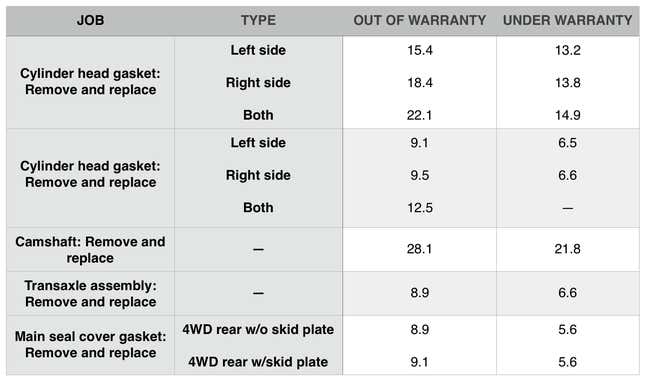
Schubkegel said it’s almost impossible to take concerns about the work hours to higher-up employees at the dealership, in part because they’re getting paid a salary and “they don’t care” to change it.
“I put a radiator in a 2015 Cadillac Escalade, it pays 4.3 hours,” Schubkegel said. “For a 2016 Cadillac Escalade, it takes 1.7 hours. So, I printed out the service information for the replacement radiator on both of the vehicles, and it was identical, yet the labor time was cut.”
Schubkegel told Jalopnik he took the concern to the dealership, and that he had to hound them for a month to get the labor times adjusted. He said he never got paid the difference for the 2016 repair. Napleton declined to comment.
With labor times being cut, the payout continues to get less viable for mechanics trying to make a living.
“It used to be much better than it is now,” Schubkegel said. “It used to be that we could work an eight-hour day and you could book 10 to 12 hours, but they’ve cut the times so dramatically.
“I made $63,000 last year, I believe it was, and I made that 25 years ago.”
A long-time technician who asked not to be named and is not from the Chicago area shared the below Ford video with Jalopnik, which announces the cutting of labor times to “increase retail work at your dealership.” The idea was to be more efficient in recalls, with the reasoning that technology has come a long way over time.
The video also mentions the efficiency gained using power tools, which the technicians Jalopnik spoke to said mechanics working at dealerships almost universally buy for themselves—many spending $50,000 or more over the years. Schubkegel and the technician outside of Chicago said there are no incentives for buying tools, and Schubkegel said GM maintains “essential tools” in a tool room.
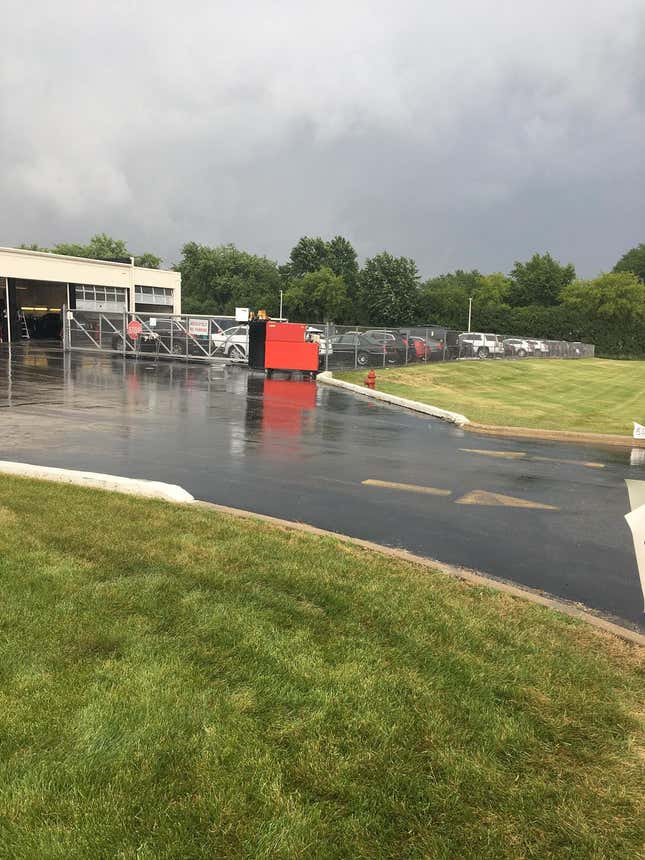
But other tools cost Schubkegel $100,000 over 42 years. The tech who shared the Ford video has been in the industry since 2002, and said he has about $30,000 in tools that he bought himself.
That technician also said it isn’t fair to chop labor times based on the power-tools claim, since technicians purchase tools to make themselves faster and earn more pay.
“We didn’t buy it to give companies a justification for lowering times, or to save them money,” the technician said. “We bought that shit so that we could be faster and make more money by being able to do more jobs.
“We’re getting paid less because we invested in ourselves? Like, you’ve got to be shitting me.”
The issue in Chicago also isn’t an hourly raise, which the dealership committee proposed in order to try to smooth things over. It’s about getting rid of the job-based pay system.
Schubkegel said unionized Chicagoland dealerships have to pay technicians for at least 34 hours if they work a 40-hour week, and his non-unionized shop pays 30 if he works at least 45 because that rule was in place before Napleton took it over. An Automotive News report also cited the work week as 40 hours to be paid for 34 in unionized shops, and Napleton declined to comment.
“It’s not a dollar amount per hour [we want],” Schubkegel said. “It’s wanting to get paid for what we do. The factory is trimming the labor rates down so much—for instance, a transmission on a 2011 Cadillac CTS used to pay eight hours. Now it pays 4.5.”
Schubkegel said he’s had wire jobs that took him eight hours to figure out, but only paid a half-hour of work. There’s also the issue of having to learn all of the new technology on cars or mentoring younger mechanics, which Schubkegel said do not pay because they are not repair jobs.
The ‘Disposable’ Treatment And The Aging Industry
The technician who shared the Ford video told Jalopnik the environment in his industry is a lot different than it used to be.
“There’s this whole ‘You’re lucky to be here’ type of mentality from employers looking down at your common person,” he said.
Schubkegel, for instance, told Jalopnik he’s been in the automotive industry since age 17. He’ll be 60 soon. His two sons followed him on that path, with his oldest son was the youngest person to receive GM’s “World Class Technician” honors in 2007, he said. The website for GM’s technical college calls a World Class Technician the “one and only GM expert.”
But even Schubkegel, with family in the business and decades in it himself, said he’d been subject to favoritism and the “You’re lucky to be here” mentality at his job. He said his service manager had favorites, and they’d get better jobs while others did the stuff that doesn’t pay the hours it actually takes.
There’s also just slow days at the shop, which will lead to technicians sitting around because there aren’t enough jobs. The technician from outside of the Chicago area said he’s worked 80-hour pay periods and only been able to log 50 hours.
His current job pays hourly rather than by jobs, since he found a boss who knew the unfair nature of the job’s pay. But that’s a rare thing to find, he said, though he thinks pay based on hours actually worked is better for the technicians—and the customers, who don’t pay for repairs done in a rushed or shortcut manner—in the long term.
But he’s worked at dealerships on the traditional pay scale that “just kept hiring people when times were busy, and didn’t care how much money technicians were making when it slowed down.” All they wanted was the work done, he said.
“They don’t care if there are more pieces of bread to put less butter on,” said the technician, who added that doing a good quality job is not first and foremost when you’re getting paid a certain amount of hours per job. “They just want the jobs done at the end of the day.”
One of Local 701’s main concerns is that the antiquated pay structure is discouraging young people from becoming technicians, something the Chicago technician on strike said was obvious at union meetings.
“It’s really hard to even put it into words,” he said. “But the last strike vote, when I was there in the union hall, we had 1,500 members. I couldn’t tell you how many men with gray hair were in there. You looked around, and you could see that it seems like the majority of those people, in 10 years, would be retired.
“There wasn’t a lot of youth in that room that day. Who’s going to fix these cars [in the future]?”
How The Dealers Reacted
Schubkegel fondly recalled a 1994 strike that he participated in, where he said the former Z Frank Oldsmobile shop listened to the concerns of employees and accommodated them on the picket line.
“They bought us out lunch, drinks,” Schubkegel said. “It wasn’t us against them, and you don’t want to piss off the customers, because you want the customers back after the strike is over. They said whatever the union wants, we’ll sign the contract and it’s done.”
The current strike is different, and for Schubkegel, that meant health insurance being immediately revoked, his tools being put outside and his job getting filled within a week.
“It’s just spiteful stuff,” Schubkegel said. “It’s inhumane.”
Schubkegel told Jalopnik technicians at Napleton Cadillac of Libertyville voted to bring the union in during October of 2016, and that the dealership, he believes purposely, failed to negotiate a contract. Because of that, he said he’s in the union but that Napleton Cadillac of Libertyville does not recognize itself as a union dealership.
The dealership’s owner, Napleton Auto Group, for their part, doesn’t dispute the latter, releasing a statement after the toolbox incident saying technicians at Schubkegel’s dealership were “nonunion workers” who “decided not to report to work.” The dealership declined to comment on the rest.
He also told Jalopnik that Napleton Cadillac won’t let workers onto the property during the strike. He said he had to watch from off of the property as his tools were pushed outside. Napleton Cadillac declined to comment.
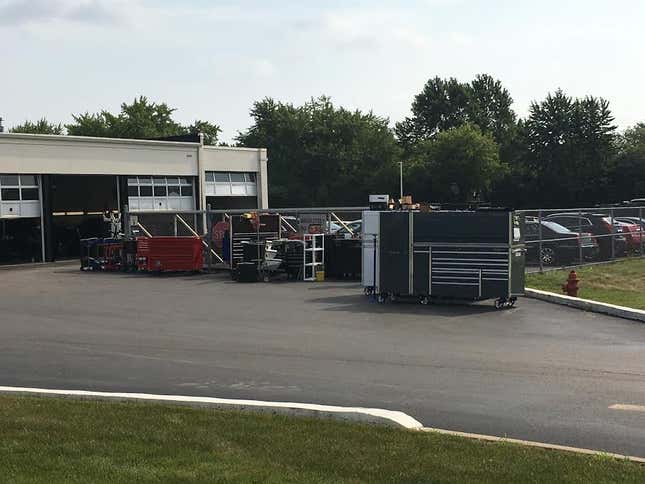
“These people over here, they won’t let us come in and use the bathroom,” Schubkegel said. “The Ford dealership across the street said to come use their bathroom. They own that Ford dealership also, the Napletons, and they called over and said not to let us in there. The Ford technicians can go in there, but not to let us in there.”
The Ford dealership across the street is Napleton Ford in Libertyville, which sits next to a Napleton-owned Mazda dealership as well. Napleton declined to comment. As for his tools, Schubkegel said the dealership eventually allowed him to come onto the property to help them move it back inside.
“They put it out and it sunk into the asphalt, and they couldn’t push it,” Schubkegel said. “They asked us about 5:15 that night to help push the toolbox. We went and pushed the toolbox in and then walked out, because we’re not supposed to be on their property but they needed us to come and help them.”
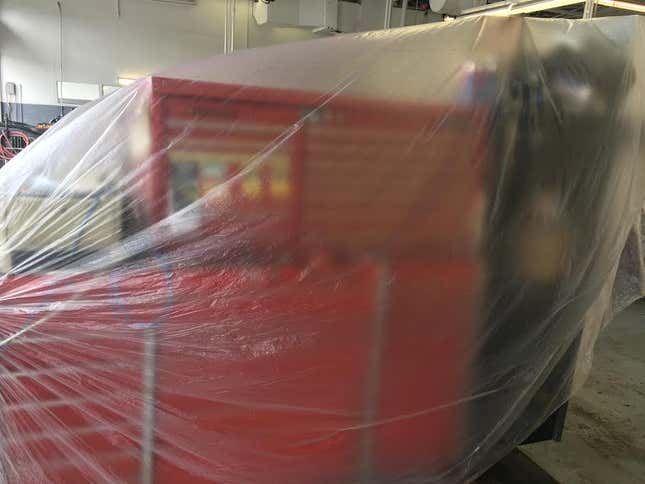
Schubkegel said the dealership left a cover of plastic with moisture on it on the toolbox all night, which he said housed all 42 years’ worth of his tools. He estimated that replacements for the rusted tools will likely be $60,000. After it happened, the dealership again told Jalopnik company policy is to not comment on the matter.
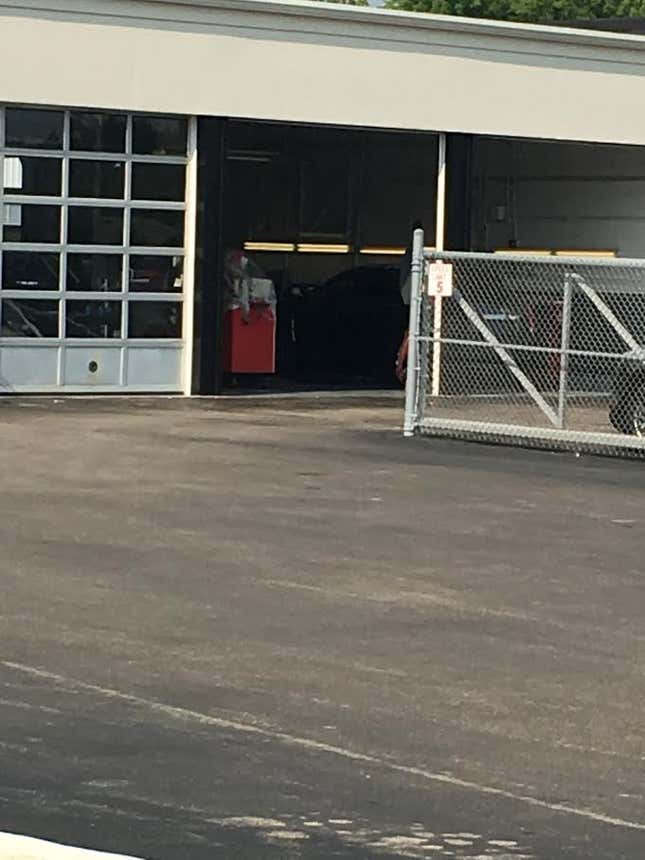
Schubkegel videoed and took photos of what he claims to be the toolboxes being pushed out from over property lines on the morning it happened, which you can see throughout this post. His only thought when it started raining, he said, was: “Somebody’s going to be in trouble.”
“They’re scare tactics,” Schubkegel said. “They’re just trying to scare us to come back in, you know?”
Schubkegel said he received a letter from Napleton Cadillac saying he’d been permanently replaced at his job on Aug. 7. He sent a photo of the alleged letter to Jalopnik, and the date was typed into a blank. That letter is pictured below. Note that Napleton, a non-unionized dealership, will allegedly require an “unconditional application” from striking technicians to be put on a hiring list to return. Napleton did not comment on the letter.
Another letter Napleton Cadillac was said to have sent to striking employees the day the strike began, Aug. 1, told them their insurance would be canceled, the toolboxes needed to be removed from the shop and that the dealership would put out job ads for replacements for the striking mechanics’ jobs. That alleged letter also said if striking technicians were replaced, they would be put on the preferential hiring list mentioned above.
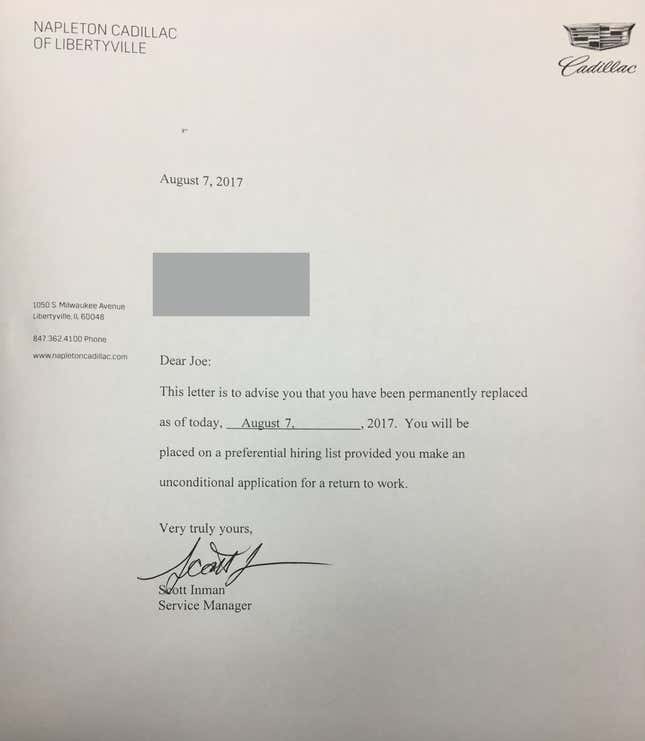
Napleton did not comment on the letter at the time it was allegedly sent out, but Jalopnik found online job ads for the dealership hiring technicians with a range of skills and positions “open immediately.”
“They’ve hired four people now,” Schubkegel said. “Every time they hire somebody, one of us gets permanently replaced. On the 7th, me and another World Class Technician—the highest category at Cadillac—we got replaced.”
Schubkegel, now apparently without a job at his former employer, said he’ll stick out the strike until things get resolved, then likely head somewhere else. He’s just trying to get through until retirement age, he said.
But with how he and others say the dealerships are reacting, it won’t be an easy thing to do.
Update, Aug. 25 at 4:05 p.m ET: A spokesperson for the New Car Dealer Committee said Schubkegel and Napleton Cadillac “are not part of the strike that this article discusses,” because Napleton does not recognize itself as a unionized dealership.
Schubkegel and other technicians from Napleton, who said they were striking when Jalopnik called, dispute this, saying their labor board approved the strike. The union itself did not respond to repeated requests for comment.
